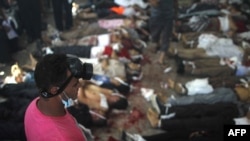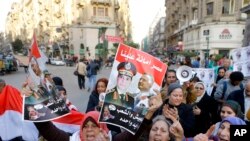CAIRO —
A roadside explosion blew out the windows of a passenger bus in a Cairo suburb Thursday, injuring five people. The blast came one day after Egypt's military-installed interim government criminalized the activities of the Muslim Brotherhood, further cracking down on a movement that had risen to power in national elections last year.
Authorities on Thursday arrested at least 18 Muslim Brotherhood members, including a former member of parliament and a son of a top leader, on the grounds of belonging to a terrorist group. The action came after Egypt's interim government declared the Brotherhood a terrorist organization, broadening its authority to move against the the country's largest opposition group.
The interim government has arrested most of the Brotherhood's top leaders since the military ousted Islamist President Mohamed Morsi on July 3, following large popular demonstrations against him. A year earlier, in June 2012, Morsi was elected Egypt's first civilian president with 51.7 percent of the popular vote.
Protests erupted in the wake of Morsi's overthrow. Army-backed security forces killed hundreds of his supporters while dispersing their protests in two major sit-in camps in Cairo, and arrested thousands more including most of the Muslim Brotherhood's top leadership.
In a Cairo suburb, Egyptian police combed through the wreckage of a red city bus Thursday morning, picking through shards of glass from blown out windows. A police detective said another homemade bomb was found nearby.
He pointed to an explosive device and said it was hidden inside an commercial billboard and appears to be homemade. He displayed what appeared to be a cooking pot, and he said it was built to pack a punch and cause as much damage as possible.
A doctor at the Nasr City hospital where blast victims were taken indicated that most of the injuries were from shrapnel. He said no one died, but that five people were wounded, one of them seriously.
The Interior Ministry described the attack as an attempt to intimidate voters ahead of a referendum next month on a new constitution, part of a plan for a democratic transition. The constitution will replace the one adopted while the Muslim Brotherhood controlled Egypt's parliament.
The decision to declare the group a terrorist organization followed a Tuesday bombing, which left 15 dead and scores wounded outside a police headquarters in Mansoura, north of Cairo.
Said Sadek, who teaches political sociology at the American University in Cairo, says the government move against the Brotherhood follows public outrage at the spate of recent terrorist attacks in the Sinai and several Egyptian cities.
A little-known militant group calls itself "Ansar Beit Al-Maqdis" claimed responsibility for the attacks. The Sinai-based group voiced contempt for the Brotherhood for lack of militancy.
Sadek said the declaration could scare away many of the Brotherhood's less committed members.
"The government position is a psychological blow to the Muslim Brotherhood social base. It will undermine the membership in the group, because members of the Muslim Brotherhood are not all at the same level of ideological commitment and dedication, and it may push some people to freeze their membership or not be active because they are scared," said Sadek.
A spokesman for Egypt's Interior Ministry told government TV Thursday that anyone participating in Brotherhood protests would be sentenced to five years in prison. He added that leaders of the group could receive the death penalty.
Authorities on Thursday arrested at least 18 Muslim Brotherhood members, including a former member of parliament and a son of a top leader, on the grounds of belonging to a terrorist group. The action came after Egypt's interim government declared the Brotherhood a terrorist organization, broadening its authority to move against the the country's largest opposition group.
The interim government has arrested most of the Brotherhood's top leaders since the military ousted Islamist President Mohamed Morsi on July 3, following large popular demonstrations against him. A year earlier, in June 2012, Morsi was elected Egypt's first civilian president with 51.7 percent of the popular vote.
Protests erupted in the wake of Morsi's overthrow. Army-backed security forces killed hundreds of his supporters while dispersing their protests in two major sit-in camps in Cairo, and arrested thousands more including most of the Muslim Brotherhood's top leadership.
In a Cairo suburb, Egyptian police combed through the wreckage of a red city bus Thursday morning, picking through shards of glass from blown out windows. A police detective said another homemade bomb was found nearby.
The Muslim Brotherhood
The Muslim Brotherhood- Egypt's largest and oldest Islamist organization
- Was banned under Hosni Mubarak
- The Brotherhood's Mohamed Morsi was elected president in 2012
- The Brotherhood won the most seats in 2012 parliamentary elections
- Brotherhood supporters have staged massive protests since Morsi's ouster
- Egypt outlawed the group again in September 2013
- Egypt's military-installed government declared it a terrorist organization in December 2013
A doctor at the Nasr City hospital where blast victims were taken indicated that most of the injuries were from shrapnel. He said no one died, but that five people were wounded, one of them seriously.
The Interior Ministry described the attack as an attempt to intimidate voters ahead of a referendum next month on a new constitution, part of a plan for a democratic transition. The constitution will replace the one adopted while the Muslim Brotherhood controlled Egypt's parliament.
The decision to declare the group a terrorist organization followed a Tuesday bombing, which left 15 dead and scores wounded outside a police headquarters in Mansoura, north of Cairo.
Said Sadek, who teaches political sociology at the American University in Cairo, says the government move against the Brotherhood follows public outrage at the spate of recent terrorist attacks in the Sinai and several Egyptian cities.
A little-known militant group calls itself "Ansar Beit Al-Maqdis" claimed responsibility for the attacks. The Sinai-based group voiced contempt for the Brotherhood for lack of militancy.
Sadek said the declaration could scare away many of the Brotherhood's less committed members.
"The government position is a psychological blow to the Muslim Brotherhood social base. It will undermine the membership in the group, because members of the Muslim Brotherhood are not all at the same level of ideological commitment and dedication, and it may push some people to freeze their membership or not be active because they are scared," said Sadek.
A spokesman for Egypt's Interior Ministry told government TV Thursday that anyone participating in Brotherhood protests would be sentenced to five years in prison. He added that leaders of the group could receive the death penalty.





